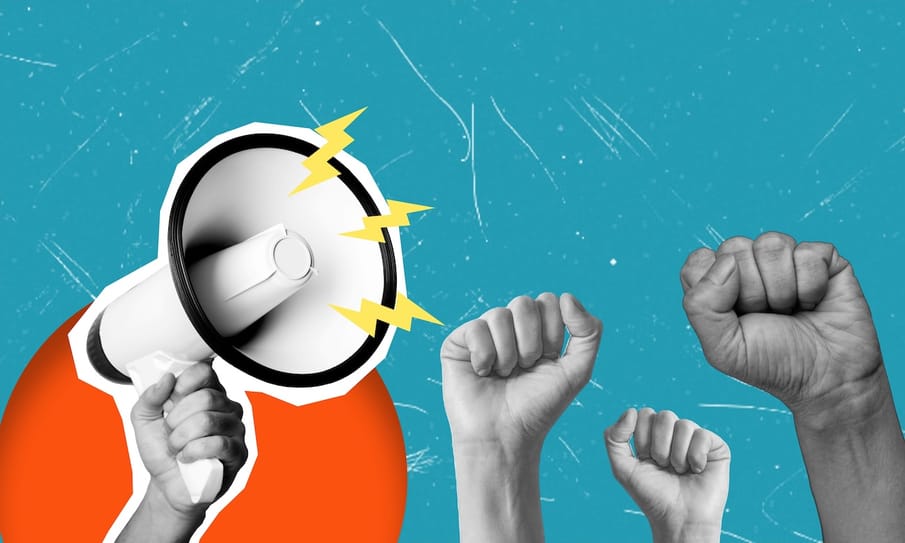Standing up for what you believe in is a powerful act. Here, we’re sharing how you can protect yourself if you choose to attend a protest…
Protesting is a fundamental way for citizens to express their opinions, challenge injustice, demand change, and hold those in power to account. But these events can get heated, leading to rising tension, verbal arguments, physical abuse, and even arrests. That’s not to mention the rush of adrenaline that you may experience while you’re there.
“Today, amidst an air of geopolitical tensions, inequality, and conflict, plus, increasingly polarised views and fears about the planets’ survival, there are many reasons to protest,” says Katherine Cavallo, psychotherapist and spokesperson for UK Council for Psychotherapy. “But should you choose to take to the streets with your placard, it’s important to understand your rights and plan your action to ensure you protest safely.”
So, what can you do to help things go smoothly?
Pack essential items
To prepare for all eventualities, bring water, snacks, a fully-charged phone, a portable charger, and any prescribed medication in a small secure bag. Bring sun protection, a waterproof jacket, and wear comfortable footwear.
Keep your cash or card in a safe place, such as a small, flat bag that can stay hidden under your clothes to prevent theft. “If you’re thinking of bringing a placard, make sure it’s safe and lightweight enough to carry and transport,” adds Katherine. “Make sure not to bring any sharp objects, locks, chains, alcohol, or illicit substances.”
Plan in advance
It’s always best to attend with a likeminded group, or a friend you can trust. If you feel uncomfortable, it’s important to be able to speak to the person you’re with openly and honestly. “If you are feeling uneasy, let your friends know, and encourage them to do the same if they need to,” suggests Katherine.
“Have a plan in advance, including what to do if you lose each other. This might include an agreed meeting point, creating a group chat, or sharing each others’ phone locations. If anyone needs a break, move away from the crowd together.”
Protect yourself if things escalate
“If the activity of other protesters makes you uncomfortable, trust your instincts,” says Katherine. “Let your friends know, and as a group, move to somewhere calm so that you feel more at ease.”
If things escalate, think about your values – such as integrity, compassion, and personal responsibility – to avoid being swept up in crowd mentality.
Know your rights
Although you have the right to protest peacefully under the Human Rights Act 1998, police can restrict protests to prevent disorder, disruption, or threats to public safety. While peaceful actions like filming or chanting are legal, causing serious disruption or committing offences (like blocking roads or trespassing) is not. Under the Public Order Act 2023, it’s a crime to attach yourself to people, objects, or land, and police have broader stop-and-search powers.
“In the unlikely event of being arrested, follow instructions and try to stay calm,” says Katherine. “You have the right to remain silent, make a phone call, and ask to speak with a solicitor as you will be entitled to free legal advice. Remember, however, that the vast majority of demonstrations happen peacefully and without incident.”
Manage stress
Protesting can be a moving experience, but it can also stir up uncomfortable emotions, like fear. This can trigger a physiological stress response and lead the nervous system to release adrenaline. “It’s important to take regular breaks to allow yourself and your friends to relax, rehydrate, and touch base,” says Katherine.
If you’re feeling overwhelmed or stressed – symptoms include a racing heart, physical tension or breathlessness – tell your friends and find somewhere quiet. Take deep, mindful breaths to soothe your nervous system.
If you’re concerned about someone else, check in with them or let a member of their group know. If someone needs medical assistance, there will likely be first responders nearby.
Wind down
“Attending a demonstration can be physically and emotionally demanding, and afterwards, you may feel full of energy or exhausted,” says Katherine. “Give yourself time to decompress, by going for a quiet walk, or having a relaxing bath. Be gentle with yourself over the coming days, and keep in touch with those who attended the demonstration with you, as it can take time to process events and emotions.”


Comments